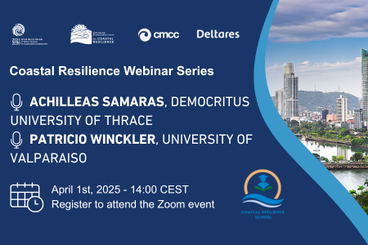Coastal Resilience School Fifth Webinar: "Innovative Solutions for Coastal Resilience" by Achilleas Samaras and Patricio Winckler

-
Date: 01 APRIL 2025 from 14:00 to 16:00
-
Event location: Online event
-
Type: Webinars
The next event in the Coastal Resilience webinar series, developed by the DCC-CR in collaboration with CMCC and Deltares, is approaching.
This Zoom session will take place on April 1, from 14:00 to 16:00 CET, as part of Module 5, "Innovative Solutions for Coastal Resilience," of the Sustainable Coastal Growth and Resilience course. This will be the final webinar of the series.
Dr. Achilleas Samaras is an Associate Professor at Democritus University of Thrace, specializing in wave dynamics, coastal flooding, and climate change adaptation. Patricio Winckler, a Civil Engineer with a doctorate from Cornell University, focuses on engineering, arts, and philosophy of science. Both have extensive international experience and have contributed to numerous research projects and publications.
Programme
The path towards coastal resilience through integrated modelling approaches: The case of Watershed-Coast Systems
By Achilleas Samaras, Democritus University of Thrace
Abstract
Building coastal resilience is an iterative process that requires bold steps to translate advances in scientific knowledge into policy and practice. The climate crisis and its observed impacts highlight the urgent need for action towards this direction, in order to mitigate and adapt to climate change in view of a dire future. These objectives are unlikely to be achieved without a pragmatic approach that prioritizes real-life applicability – a goal attainable only through integrated modelling systems.
The webinar will focus on Watershed-Coast Systems (i.e. entities consisting of watersheds and the coastal areas adjacent to their outlets), examining their dynamics through the lens of a spatiotemporal continuum. In this context, the webinar will: (a) outline a methodological framework for adapting integrated modelling approaches for management and engineering purposes, (b) systematise how various tools (data, methods, models, etc.) and concepts can be leveraged for informed decision-making towards resilient systems in a changing climate, and
(c) highlight key considerations for bridging the gaps between science, society and governance.
Coastal engineering on tectonically active coasts. Hazards, impacts and adaptation
By Patricio Winckler, University of Valparaiso
Abstract
The Pacific coasts of South America are subjected to a complex spectrum of anthropogenic, geophysical and climate-driven perturbations. The territory is characterized by strong latitudinal gradients, with a climate ranging from the most arid region worldwide (18°S) to the rainforests of Patagonia (55°S). Its coastline, shaped by the tectonically active Peru-Chile trench, is formed by both a heterogeneous coastline facing the narrowest continental shelf worldwide and an extensive fjord region. The relatively frequent occurrence of large earthquakes and tsunamis, along with the steadily increasing sea level rise and highly energetic coastal storms, provide unique conditions to investigate impacts on human and natural systems from a multi-hazard perspective. Relative mean sea level trends are spatially heterogeneous and shaped by the seafloor deformation during earthquakes, which is comparable in magnitude to centuries of climate-driven sea-level rise. In the last decades, coastal storms have increased in frequency and intensity, explaining the erosion of ~80% of the beaches and augmenting operational shutdowns of major ports in the country. Recent studies show these trends will be enhanced during the XXI century, calling for an urgent need to strengthen the implementation of adaptation actions, several of which will be analyzed in the talk.
Recording and Presentations
-
-
Achilleas G. Samaras
-